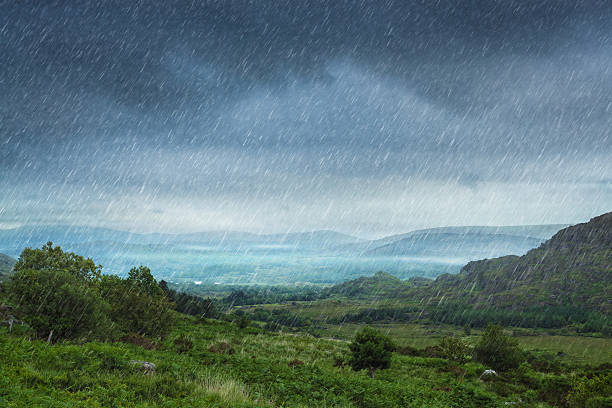
Although we are still in Vata season until the early spring comes around, Kapha dosha has been present with this rainy weather. It is still cold and windy, but moist & wet have momentarily replaced the dry quality of Vata season. Vata and Kapha are opposites and we often use the qualities of Vata to balance Kapha and vice versa. We can make intuitive decisions and look at the few similarities of these doshas to live in harmony with the seasons. So how do we keep a balance when both of these doshas are elevated? Lets compare Vata and Kapha:
Vata: ether + air.
Gunas (qualities): dry, light, mobile, cold, rough, subtle, clear
Kapha: water + earth.
Gunas: moist, heavy, cold, slow, oily, liquid, smooth, dense, soft, static, cloudy, hard, gross
Vata and Kapha both are cold, so the first thing we can do the pacify this dosha is to stay warm! Staying warm refers to clothing, food, spices, exercise and meal times. Keep the head and neck warm with a scarf and hat and wear socks around the house. The seat of kapha is in the lungs, so cold and wet weather plus low immunity can cause illnesses to manifest in the weak spots. The cold can enter the body through the back of the neck and feet.
Warming spices are great for both doshas, as Vata can have irregular digestion and Kapha can have slow digestion. When we eat, more heat goes to our abdomen to digest, sometimes causing our limbs and periphery to get cold. We can avoid this occurrence by having regular mealtimes instead of snacking. Aside from heat transference during digestion, snacking isn’t a good idea for both these doshas due to variable or slow digestive tendencies. We also don’t want to be consuming cold or raw foods when Vata and Kapha doshas are elevated. This means no salads, raw cucumber or celery sticks, iced drinks, ice creams or smoothies. If something isn’t cold or raw, we can ask ourselves if it’s heavy or easy to digest? Some things that are hard to digest are cheese, corn, pork, tomatoes, peanut butter and leftovers. Another thing we can do is not combine incompatible foods. Examples of this are combining fruit with cooked meals or consuming fish and dairy together.
The moist, wet and cold qualities of the rain can force us to be indoors and less active, which increases Kapha dosha. We want to ground the airiness of Vata without getting too sluggish and creating excess Kapha. This may look like doing a warming exercise at home or in a heated space while its rainy or wet outside. This could be vinyasa yoga, Pilates, medium weight lifting, stationary biking or treadmill exercises. Getting our blood pumping is important for generating heat, healthy circulation and detox.
We can also pacify increased Vata and Kapha by having a regular sleep schedule. It’s easy to stay up too late when you have been indoors all day and expended less energy. It can also be hard to get out of bed in the morning when it’s cold. Going to bed at a reasonable time and not hitting snooze multiple times in the morning is something we can probably all work on.
Depending on your own personal constitution, you may have more Vata or more Kapha to balance. The weather, the season, and your body constitution are at play together, creating a situation unique to only you. Be mindful of this when making decisions about food, exercise and your daily routine.
Here is a list of foods that are good for elevated Vata & Kapha:
Spices & Herbs: ginger, cumin seeds, brown mustard seeds, pepper, cinnamon, turmeric, cardamom, cloves and salt are great options. Ginger tea between meals to keep the digestion warm and strong. Thyme, rosemary and oregano are great immunity herbs to add to dishes and soups!
Fruits: in season fruits; apples, pears, mandarins, oranges, feijoas & pomegranates
Vegetables: asparagus, beets, carrots, cauliflower, fennel, leeks, pumpkin, winter squash, cooked greens & garlic
Grains: amaranth, quinoa, millet, pearled barley, rice, red lentils & mung beans
Meat: white meats and salmon
Oil: ghee, olive oil and sesame oil
Sweetener: honey
https://santacruzayurveda.com/balancing-vata-kapha-during-rainy-weather/
Comments
Post a Comment